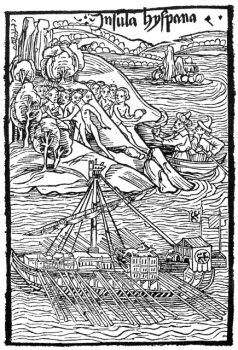Archive by Author
Latin literature II Posted by leire on Feb 29, 2012
Literary genres Classical literature was divided into various literary genres, which remain to these days. However, the scope of this concept has changed: in Greece and Rome genres had a clear formal distinction, no one could write a play with dactylic hexameter verses. The formal distinction between genders was sharp and did not affect only…
Latin literature I Posted by leire on Feb 28, 2012
Literature is one of the great achievements of the classical world, and it still survives with great vigor. Giving the written word an aesthetic value is something that had happened before, but not with the intensity and importance that it acquired during classical antiquity. A crucial aspect of the character of the Roman world was…
Latin Numerals Posted by leire on Feb 25, 2012
The cardinal numerals The cardinal numerals express the number or quantity. Most of the cardinal did not decline, the only ones that were declined are: UNO Masculine Feminine Neuter Nominative unus una unum Accusative unum unam unum Genitive unius Dative uni Ablative uno una uno DOS Masculine Feminine Neuter Nominative duo duae duo…
Latin Adjectives II Posted by leire on Feb 19, 2012
DEGREES OF SIGNIFICANCE Comparative degree The systematic degrees of comparison are: inferiority, equality and superiority. The comparison of inferiority and equality is made with an adverb that modifies the adjective in positive degree and the second term (which will be in the same case as the first) introduced by quam. Titus minus doctus quam…
Latin Adjectives I Posted by leire on Feb 16, 2012
1st GROUP They are declined using the ends of the first and second declensions. Using the second declension for masculine and neuter, and the first for feminine. Singular Plural Masculine Feminine Neuter Masculine Feminine Neuter Nominative -us, -er -a -um -i -ae -a Vocative -e, -er -a -um -i -ae -a Accusative -um…
The discovery of America in Latin Posted by leire on Feb 7, 2012
Here is a selection of short texts from the Latin translation of Columbus’ letter to Gabriel Sanchez, treasurer of the kingdom of Aragon, on March 14, 1493, giving news of his first voyage to the Indies. The Castilian text was soon translated into Latin by Leandro de Cosco for spreading rapidly the news of the…
XVIII International Botanical Congress and the end of the use of Latin Posted by leire on Jan 31, 2012
The title of this post is not completely faithful to reality. Recently, during the XVIII International Botanical Congress, it was decided that from January 1st 2012 it would not be compulsory to use Latin for botanical description of species. Now you can use either Latin or English. The names of the plants, though, will remain…




